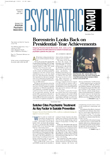For a long time, doctors as well as the public believed that anorexia nervosa was due to psychological and cultural factors such as the pressure that fashion magazines exert on young women to look as thin as models.
Then family studies started suggesting that there might be a genetic input into this serious and sometimes fatal disorder. And then genetic investigations even pointed to a possible genetic culprit—a mutation in a gene that makes a receptor for the neurotransmitter serotonin.
Now the case for a genetic input into anorexia nervosa appears to have become even stronger. This time it has to do with the gene that makes a protein that goes by the name “agouti-related protein,” or AGRP for short.
The finding comes from Roger A.H. Adan, Ph.D., a molecular pharmacologist with the Rudolf Magnus Institute for Neurosciences in Utrecht, the Netherlands, and his coworkers. They report their findings in the April issue of Molecular Psychiatry.
The protein AGRP is known to play a crucial role in maintaining body weight by inducing food intake. For instance, when AGRP was injected into the brains of rodents, it was found to stimulate food intake. It is also known to suppress the melanocortin-4 receptor, which in turn is known to decrease food intake. Thus, Adan and his colleagues suspected that a mutation or mutations in the gene that makes AGRP might play some role in anorexia nervosa, and they conducted a study to find out.
First, they determined the nucleotide sequence of the AGRP gene, which resides on chromosome 16. Then they screened 100 anorexia patients to see whether the patients might show evidence of mutations in the AGRP gene. They found three different mutations among the patients.
They then screened an additional 45 anorexia patients and 244 control subjects to see whether these persons harbored one or more of the three mutations.
The patients had significantly more of two of the three mutations than the control subjects did, they found, suggesting that the two mutations might play a role in anorexia susceptibility. In contrast, the patients did not carry significantly more of the third gene mutation than control subjects did, implying that this mutation did not contribute to anorexia susceptibility.
How might the two gene mutations predispose a person to anorexia? Possibly by failing to properly suppress the melanocortin-4 receptor, the researchers suggest.
Walter Kaye, M.D., a professor of psychiatry at the University of Pittsburgh Medical Center and an authority on the genetic aspects of anorexia, is familiar with the study by Adan and his team.
“I think it is very interesting, but it needs to be viewed in perspective,” he told Psychiatric News. For instance, he pointed out, “it is not like the researchers discovered that this is a gene that is abnormal in everybody with anorexia. What they have discovered is that roughly 11 percent of the people with anorexia have this genetic variant. And having the variant may not even change anything in terms of physiology. So what this really suggests is, this might be one of those minor contributing influences that probably doesn’t act by itself. It probably only acts in alliance with other gene variants that are yet to be discovered.”
What is really important about this study, Kaye stressed, is that it adds to the growing body of evidence that anorexia is, at least in part, a genetically transmitted disorder—something that few people would have guessed a few years ago.
The study, “Association Between an Agouti-Related Protein Gene Polymorphism and Anorexia Nervosa,” can be accessed on the Web at www.nature.com/mp for a fee. ▪
